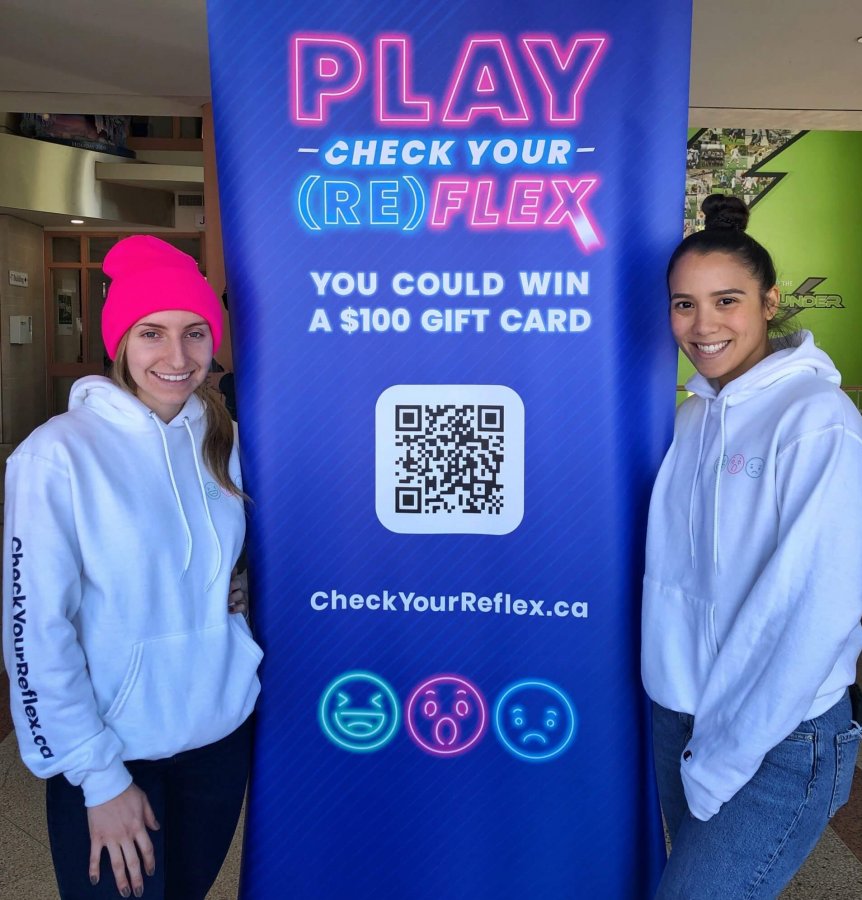RGC Program Licensing
Bringing RGC Prevention Programs to your Community.
For over 20 years RGC has created innovative and impactful problem gambling prevention programs across an array of platforms and jurisdictions. Backed by over 35 years of leadership experience, our programs are evidence based and customized to address the unique needs of the target audience. They cross the spectrum of prevention education from low-risk gambling practices to spotting the signs of a gambling problem and accessing help, across a range of ages and languages.
RGC programs are available for licensing.
Our team of program specialists can work with you to adapt programs to fit the prevention needs of your jurisdiction and budget. Below are programs currently available for licensing. For more information please reach out to programs@rgco.org.
Youth Programs
GAME BRAiN: Interactive Live Game Show

Legally, teenagers are not permitted to gamble. However, for many teens – like the 31% in Ontario who report having gambled in the last year, gambling not being legal hasn’t stopped them.
RGC’s youth program GAME BRAiN is an interactive educational game show designed to educate and engage high school students on the risks of youth gambling.
GAME BRAiN’s 45 minute presentation includes five fun game-style activities which look at the realities of gambling, losses, signs of a gambling problem, avoiding the risks and available help resources.
For the past 6 years, GAME BRAiN has hosted over 150 events and reached 50,000 Ontario students RGC recently added a parent strategy to reinforce the main learnings and help parents continue the dialogue with their teens at home.
RGC’s GAME BRAiN program also includes a Social Media campaign that has fun social posts, IG stories and a hashtag video contest which serves to extend the reach of the messaging.
“Our partnership with the Responsible Gambling Council (RGC) through the GAME BRAiN program has been a vital step toward our goal of promoting a culture of safer gambling and preventing problem gambling, especially among youth. By implementing the program across schools and football academies in Cyprus, we’ve seen firsthand the profound impact it has on educating young individuals about the risks of problem gambling.
GAME BRAiN’s interactive and innovative approach resonates deeply with students, equipping them with the knowledge and tools to make informed decisions about gambling. In today’s rapidly evolving digital landscape, where access to online gambling and gaming is at an all-time high, this kind of early intervention is more crucial than ever.
Our collaboration with RGC has allowed us to foster an environment of prevention and awareness for youth in Cyprus. The RGC’s team is highly professional, with extensive expertise in problem gambling prevention, ensuring the program’s success and its meaningful impact on students and young adults.”
(Christina Christoforou, Head of Safer Gambling & Business Development Directorate, National Betting Authority)
GAME BRAiN: House of Wisdoms
In 2020, GAME BRAiN launched its first digital awareness game, House of Wisdoms (HOW).
HOW features include:
- Single player web-based game with multiple mini games/rounds
- Highly visual, whimsical characters
- Key program messages of gambling losses, signs of a gambling problem, common misconceptions about gambling and available help resources
To learn more about the GAME BRAiN program, contact us.
PLAY NOW
Young Adult Programs
Check Your (Re)flex

Young people between the ages of 18-24 are at a high risk of developing gambling problems.
They are significantly more likely to engage in risky activities like chasing losses and betting more than they can afford.
RGC’s young adult program, Check Your (Re)flex is designed to address these and other gambling concerns targeting this demographic.
CYR features both online and in-person delivery components:
- A portable kiosk staffed by trained representatives that invite young adults (18-24) to play a video game meant to simulate the body’s response when gambling
- Online and mobile version of the game
- Social media campaign that delivers program messages and drives to the online game and messaging
Want to try out Check Your (Re)flex? Visit checkyourreflex.ca and contact us to learn more.
Know the Score (KTS2)
A College/University Campus program. KTS2 educates students on understanding the risks of gambling and gaming and low risk strategies to mitigate them. With over 15 years’ experience delivering this program, it has also been licensed to Atlantic Canada and New York State.
The program features both online and in-person delivery components:
- Trained student staff encourage students to check out an interactive display and participate in a quiz that focuses on the four program messages.
- Upon completion of the quiz students are entered into a scholarship contest.
- Online version of the quiz is also availble, that includes program messages and campus visit dates.
- Social media campaign promoting campus visits and program messages.
To learn more about this program, contact us.
Prevention Campaigns
General prevention and social marketing campaigns, ready for deployment.
Don’t Suffer Alone
Don’t Suffer Alone is an award-winning, evidence-informed social marketing program that focuses on individuals who may be experiencing gambling-related harm.
Specifically, Don’t Suffer Alone addresses the feelings of isolation stemming from shame and fear that a variety of problem gamblers and their loved ones deal with.
A series of YouTube videos were created that use a creative misdirect approach to engage the viewer. This interactive and impactful program was delivered in English, French, Chinese and Vietnamese.
To learn more about Don’t Suffer Alone, contact us.
Stop the Chase
A digital campaign, Stop the Chase highlights a key sign of harmful gambling: chasing losses. Research has shown that chasing losses is shown to be the main early indicator of a potential gambling problem and Stop the Chase creates awareness around the temptation to chase gambling losses and the ego’s role in chasing.
This web-based experience combines social pre-roll, a dodging-style interactive video game Dodger, and educational print elements about gambling fallacies and how to take back control.
To see this campaign in action, visit StopTheChase.ca and contact us to learn more.
Check Your Blind Spot
One of RGC’s initial outreach initiatives, this easily transferable program is centered around the early warning signs of a gambling problem.
The digital component of the campaign contains posters and banner ads feature playing cards that have warning signs and symbols hidden with them, encouraging participants locate them.
A team of program ambassadors hold interactive events with a mobile display unit, placed in the lobbies of gaming venues (casinos, bingo halls/ racetracks). Messaging is communicated through visitor encouragement to look for the symbols representing the six blind spots hidden in the players card graphic. All participants receive information giveaways, some of which are specifically designed to link program messaging to the local treatment agency’s services as another way to promote where to go for help locally, if needed.
Check Your Blind Spot aims to get the target audience to think more carefully about their gambling behaviours and avoid future problems.